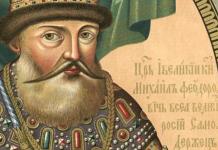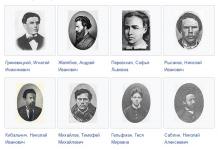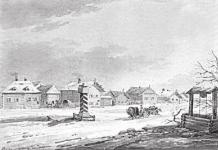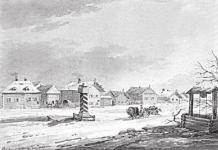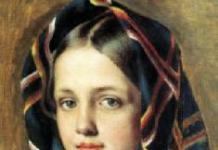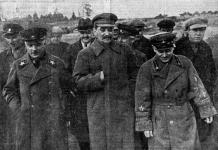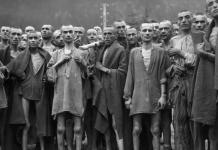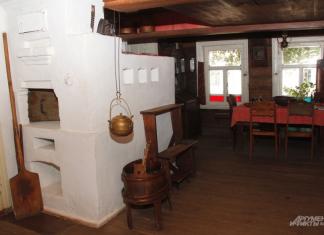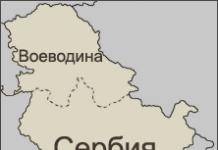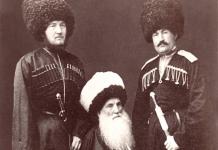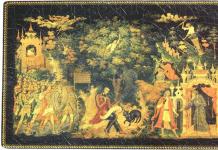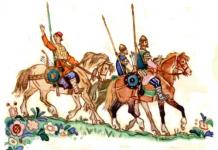“I don’t want, like Kostomarov, gray wolf scour the earth, nor, like Solovyov, spread like a gray eagle under the clouds, nor, like Pypin, spread my thoughts along the tree, but I want to tickle the Foolovites, dear to me, showing the world their glorious deeds and the kind root from which this famous tree grew and branches covered the whole earth with its own.”
This is how it starts story chronicler, and then, having said a few words and praised his modesty, he continues.
There was, he says, in ancient times a people called bunglers, and they lived far to the north, where Greek and Roman historians and geographers suggested the existence of the Hyperborean Sea. These people were nicknamed bunglers because they had the habit of "pulling" their heads on everything that they met on the way. The wall will fall - they sting against the wall; They will start praying to God - they are grabbing the floor. Many independent tribes lived in the neighborhood of the bunglers, but only the most remarkable of them were named by the chronicler, namely: walrus-eaters, onion-eaters, thick-eaters, cranberries, kurales, swirling beans, frogs, lapotniks, black-nosed, dolbezhniks, broken heads, blind beards, lip-slaps, lop-eared, kosobryukhi, vendace, corners, kroshevniks and rukosui. These tribes had no religion, no form of government, replacing all this with the fact that they were constantly at enmity with each other. They made alliances, declared wars, reconciled, swore each other in friendship and fidelity, when they lied, they added “let me be ashamed”, and were sure in advance that “shame will not eat out the eyes”. Thus they mutually ruined their lands, mutually abused their wives and virgins, and at the same time were proud of being cordial and hospitable. But when they got to the point that they tore the bark from the last pine tree into cakes, when there were no wives or maidens and there was nothing to continue the “human factory”, then the bunglers were the first to take up their minds. They realized that someone had to take over, and they sent to tell the neighbors: we will wrestle with each other until then, until someone outweighs whom. “They did it cunningly,” says the chronicler, “they knew that their heads were growing strong on their shoulders, so they offered it.” And indeed, as soon as the simple-hearted neighbors agreed to the insidious proposal, the bunglers immediately, with God's help, ripped them all up. The first succumbed to the blind-bearers and rukosui; more than others, the ground-eaters, vendaces and kosobryukhi held on. To defeat the latter, they were even forced to resort to cunning. Namely: on the day of the battle, when both sides stood up against each other as a wall, the bunglers, unsure of the successful outcome of their case, resorted to witchcraft: they let the sun shine on the belly. The sun, by itself, was so standing that it should have shined in the eyes of the slanted belly, but the bunglers, in order to give this case the appearance of witchcraft, began to wave their hats in the direction of the slanted belly: here, they say, what we are like, and the sun is at one with us. However, the kosobryukhy were not immediately frightened, but at first they also guessed: they poured oatmeal from the bags and began to catch the sun with bags. But they didn’t catch him, and only then, seeing that the truth was on the side of the bunglers, they brought guilt.
Gathering together Kurales, Gushcheeds and other tribes, the bunglers began to settle inside, with the obvious goal of achieving some kind of order. The chronicler does not set out the history of this device in detail, but cites only separate episodes from it. It began with the fact that the Volga was kneaded with oatmeal, then they dragged a calf to a bathhouse, then they boiled porridge in a purse, then they drowned a goat in malted dough, then they bought a pig for a beaver, but they killed a dog for a wolf, then they lost bast shoes and looked around the yards: there were bast shoes six, but they found seven; then they met the crayfish with a bell ringing, then they drove the pike from the eggs, then they went to catch a mosquito for eight miles, and the mosquito sat on the nose of the Poshekhonets, then they exchanged the father for a dog, then they caulked the jail with pancakes, then they chained the flea to the chain, then the demon became a soldier they gave it away, then they propped up the sky with stakes, finally they got tired and began to wait what would come of it.
But nothing happened. The pike sat on the eggs again; the pancakes with which the prison was caulked were eaten by the prisoners; the purses in which the porridge was boiled burned down along with the porridge. And dissension and uproar went worse than before: again they began to ruin each other's lands, take their wives into captivity, swear at the virgins. There is no order, and it is full. They tried again to fight with their heads, but even then they did not finish anything. Then they decided to look for a prince.
He will provide us with everything in an instant, - said the elder Dobromysl, - he will make soldiers with us, and he will build a prison, which follows! Aida guys!
They searched, they searched for the prince and almost got lost in three pines, but thanks to that there happened to be a blind-breed, who knew these three pines like the back of his hand. He led them to the beaten path and led them straight to the prince's courtyard.
Who you are? and why did you complain to me? - the prince asked the messengers.
We are bunglers! we are not in the light of the people wiser and braver! We even threw our hats on the bellies and those! - boasted bunglers.
What else have you done?
“Yes, they caught a mosquito seven miles away,” the bunglers began, and suddenly they became so funny, so funny ... They looked at each other and burst out.
- But it was you, Pyotra, who went to catch a mosquito! Ivashka laughed.
- An you!
- No, not me! he was sitting on your nose!
Then the prince, seeing that they did not leave their strife even here, in front of him, became very inflamed and began to teach them with a rod.
You are stupid, you are stupid! - he said, - you should not be called bunglers, according to your deeds, but fools! I don't want to be stupid! but look for such a prince, which is not more stupid in the world - and he will rule you.
Having said this, he taught a little more with a rod and sent the bunglers away from him with honor.
The bunglers thought about words prince; They walked all the way and thought everything.
Why did he cast us out? - said some, we are to him with all our hearts, and he sent us to look for the stupid prince!
But at the same time, others also turned up who did not see anything offensive in the words of the prince.
What! - they objected, - the stupid prince will probably be even better for us! Now we give him a gingerbread in his hands: chew, but don’t hush us up!
"That's true," agreed the others.
The good fellows returned home, but at first they decided to try again to settle themselves. They fed the rooster on a rope so that it would not run away, they ate the god ... However, it was all to no avail. They thought and thought and went to look for the stupid prince.
They walked on level ground for three years and three days, and still could not get anywhere. Finally, however, they reached the swamp. They see a chukhloma-handsup standing on the edge of the swamp, his mittens are bitter behind his belt, and he is looking for others.
Don't you know, dear handyman, where can we find such a prince, so that he would not be more stupid in the world? - pleaded bunglers.
I know there is one, - the hand answered, - go straight through the swamp, just here.
They all rushed at once into the swamp, and more than half of them sank here (“Many were jealous for their land,” says the chronicler); Finally, they crawled out of the bog and saw: on the other side of the swamp, right in front of them, the prince himself was sitting, yes, stupid, stupid! Sits and eats hand-written gingerbread. The bunglers rejoiced: that's the prince! We don't want anything better!
Who you are? and why did you complain to me? - said the prince, chewing gingerbread.
- We're bunglers! We are no people wiser and braver! We are the Gushcheeds - and they won! bragheads boasted.
- What else have you done?
- We drove the pike from the eggs, we kneaded the Volga with oatmeal ... - the bunglers began to list, but the prince did not want to listen to them either.
I'm so stupid, he said, - and you are even more stupid than me! Does a pike sit on eggs? or is it possible to knead a free river with oatmeal? No, you should not be called bunglers, but fools! I do not want to rule over you, but look for yourself such a prince, which is not more stupid in the world - and he will rule over you!
And, having punished with a rod, he released with honor.
The bunglers thought: the chicken's son cheated! He said, this prince is not stupider - but he is smart! However, they returned home and again began to settle by themselves. In the rain, they dried the onuchi, they climbed to look at the Moscow pine tree. And everything is not as there is no order, and it is complete. Then Peter Komar advised everyone.
I have, - he said, a friend, a friend, nicknamed a thief-innovator, so if some kind of burnout of the prince does not find, then you judge me with a merciful court, chop off my mediocre head from my shoulders!
He expressed this with such conviction that the bunglers obeyed and called in a new thief. For a long time he bargained with them, asked for gold coins and money for the search, but the bunglers gave a penny and their stomachs in addition. Finally, however, they somehow managed to come to terms and went to look for the prince.
You look for us such that he was unwise! - the bunglings said to the new thief, - why should we be wise, well, to hell with him!
And the thief-innovator led them at first all in a spruce forest and a birch forest, then in a dense thicket, then in a copse, and led them straight to a clearing, and in the middle of that clearing the prince was sitting.
As the bunglers looked at the prince, they froze. He sits, this, in front of them is a prince and a smart, smart one; he shoots at the gun and waves his saber. Whatever fires out of a gun, the heart will shoot through, whatever it waves with a saber, then the head is off your shoulders. And the innovative thief, having done such a dirty deed, stands, strokes his belly and smiles in his beard.
What you! crazy, crazy, crazy! will this one come to us? they were a hundred times more stupid - and they did not go! - the bunglings attacked the new thief.
- Nothing! we'll have it! - said the innovator thief, - give me time, I'll have a word with him eye to eye.
The bunglers see that the thief-innovator has traveled around them on a curve, but they dare to back down.
- This, brother, is not something to fight with slanted foreheads? no, here, brother, give an answer: what is a person like? what rank and rank? they chatter among themselves.
And this time the thief-innovator reached the prince himself, took off his sable cap in front of him and began to speak secret words in his ear. They whispered for a long time, but they didn’t hear about anything. Only the bunglers sensed how the root-novotor said: “To tear them, your princely grace, is always very free.”
Finally, it was their turn to stand before the clear eyes of his princely lordship,
What kind of people are you? and why did you complain to me? the prince turned to them.
- We're bunglers! there is no braver people among us,” the bunglers began, but suddenly they became embarrassed.
- I heard, gentlemen bunglers! - the prince chuckled (“and he smiled so affectionately, as if the sun shone!” - the chronicler remarks), - he heard it very much! And I know how you met cancer with a bell ringing - I know enough! I don’t know about one thing, why did you complain to me?
“But we came to your princely grace to announce this: we committed a lot of murders among ourselves, we did a lot of ruin and abuse to each other, but we don’t have all the truth. Go and Volodya us!
- And who, I ask you, were you before this from the princes, my brothers, with a bow?
- And we were with one stupid prince, and with another stupid prince - and they didn’t want to take care of us!
- Okay. I want to lead you, - said the prince, - but in order to go to live with you, I won’t go! I will push!
The bunglers lowered their heads and said:
- So!
“And you will pay me many tributes,” the prince continued, “whoever brings a sheep to a bright one, write a sheep on me, and leave a bright one for yourself; whoever has a penny, break it into four: give one part to me, the other to me, the third again to me, and keep the fourth for yourself. When I go to war - and we go! Other than that, you don't care!
- So! - answered the bunglers.
- And those of you who do not care about anything, I will have mercy; the rest of all - to execute.
- So! - answered the bunglers.
“And since you didn’t know how to live on your own, and you yourself, stupid, wished for yourself bondage, then you will henceforth be called not bunglers, but Foolovites.
- So! - answered the bunglers.
Then the prince ordered the envoys to be surrounded by vodka and presented with a cake, and a scarlet scarf, and, having imposed many tributes, he released him with honor.
The bunglers went home and sighed. “They sighed unrelentingly, they cried out loudly!” - the chronicler testifies. “Here it is, what a princely truth!” they said. And they also said: “We did it, we did it, and we did it!” One of them, taking the harp, sang:
Don't make noise, mother green dubrovushka!
Do not interfere with the good fellow thinking,
How in the morning I, good fellow, go for interrogation
Before the formidable judge, the king himself ...
The further it poured song, the lower the heads of the bunglers drooped. “There were among them,” says the chronicler, “the old people were gray-haired and wept bitterly that they had squandered their sweet will; were also young; who barely tasted that will, but they also wept. It was only then that they came to know it, what a beautiful will it is.” When the final verses of the song were heard:
I'm for you, kid, I'll take pity
Among the field, high mansions,
That two pillars with a crossbar ... -
then they all fell on their faces and wept.
But drama already done irrevocably. Arriving home, the bunglers immediately chose a swamp and, having founded a city on it, they called themselves Foolov, and after that city they called themselves Foolovites. “So this ancient branch flourished,” adds the chronicler.
But the thief-innovator did not like this humility. He needed riots, because by pacifying them he hoped to win the favor of the prince for himself, and to collect swag from the rebels. And he began to pester the Foolovites with all sorts of falsehoods, and indeed, not for a long time kindled riots. First the corners rebelled, and then the rennets. The thief-innovator went at them with a cannon shell, fired indefatigably and, having burned everyone, made peace, that is, he ate halibut at the corners, and abomasums at the rennets. And he received great praise from the prince. Soon, however, he was stealing so much that rumors about his insatiable theft even reached the prince. The prince became inflamed and sent a noose to the unfaithful slave. But the novotor, like a real thief, also dodged: he preceded the execution by not waiting for the loop, he stabbed himself with a cucumber.
After the new thief, an Odoevite came to “replace the prince”, the same one who “bought lean eggs for a penny”. But he also guessed that without riots he could not live, and he also began to pester. The kosobryukhi, Kalashnikovs, strawmen rose - everyone defended the old days and their rights. Odoevets went against the rebels, and also began to fire relentlessly, but he must have fired in vain, because the rebels not only did not humble themselves, but carried away the black-skyed and lip-slaps with them. The prince heard the stupid shooting of the stupid odoevtsa and endured for a long time, but in the end he could not stand it: he went out against the rebels in his own person and, having burned everyone to the last, returned home.
I sent a real thief - it turned out to be a thief, - the prince was sad at the same time, I sent an Odoyevets nicknamed "sell lean eggs for a penny" - and he turned out to be a thief. Who will I send now?
He thought for a long time which of the two candidates should be given the advantage: whether the Orlovites - on the grounds that “Eagle and Kromy are the first thieves” - or the Shuyanin, on the grounds that he “had been to St. Petersburg, poured on the floor and didn’t fall here” , but, finally, he preferred the Orlovets, because he belonged to the ancient family of "Broken Heads". But as soon as the Orlovets arrived at the place, the old people rose up in a riot and, instead of the governor, met the rooster with bread and salt. An Orlovet went to them, hoping to feast on sterlets in Staritsa, but found that there "only enough mud." Then he burned the Staritsa, and gave the wives and maidens of the Staritsa to himself for reproach. “The prince, having learned about it, cut his tongue.”
Then the prince once again tried to send a "simpler thief" and for these reasons he chose a Kalyazin who "bought a pig for a beaver", but this one turned out to be even a worse thief than the Novotor and Orlovets. He rebelled against the Semendyaev and Zaozertsy and "killed them and burned them."
Then the prince bulged his eyes and exclaimed:
- Carry the stupidity of the pot, like stupidity!
And I arrived in my own person to Foolov and cry out:
- I'll shut up!
With this word began historical times
Let's think about what we read...
1. How do the characters of the heroes of this work resemble some fairy-tale characters?
2. What satirical techniques help to understand the real essence of the "acts" of the mayors?
3. Think about how the city of their "activities" of the Foolov mayors could suffer. Whatproverb did they justify their activities? What kind of "order" did the bunglers achieve when they brought together the neighboring tribes? What word began "historical times"?
4. What does Shchedrin want to achieve with his satirical depiction of the officials and mayors of the then Russia? What suggestswriter "wake up" in society?
"History of a City" summary which is given in this article, this is an ironic, grotesque chronicle of the city of Glupov. The satire of Saltykov-Shchedrin is transparent, so the face of modern Russia is easily guessed in the text.
Only at first glance it seems that the story, like an inventory of city governors, is a gallery of madness and human moral deformities. In fact, each image is recognizable in its own way.
Unfortunately, the work does not lose its uniqueness to this day.
The history of the creation of the "History of one city"
The idea of the work was nurtured by the author for several years. In 1867, a story appears about a mayor with a stuffed head, eaten with appetite at the end. This hero was transformed into a governor named Pimple. And the story itself became one of the chapters of the story.

Mikhail Evgrafovich Saltykov-Shchedrin (1826-1889)
A year later, the author began writing the chronicle of Glupov. The work lasted over a year. Initially, the work was called "Glupovsky Chronicler", the final title appeared later. The name change is due to the fact that the second carries a wider semantic load.
In the year of graduation, the story was first published in the almanac "Notes of the Fatherland", where Mikhail Evgrafovich signed with the pseudonym N. Shchedrin. A self-published edition comes out six months later. The text is somewhat different. The sequence of chapters has been changed, and the characteristics and descriptions of the governors have been rewritten in abbreviation, but have become more expressive.
Main characters and their characteristics
The main characters of the work are the mayors and townspeople - the inhabitants of Glupov. Below is a table with specifications. A brief overview of the main characters is given.
| Amadeus Manuylovich Klementy | Italian. At home he served as a cook. His signature and most delicious dish was pasta. The Duke of Courland, admiring his culinary skills, took him with him as a family cook. After Amadeus Manuylovich received a high status, which helped him to take the post of mayor. Klementy forced all the Foolovites to make pasta. Sent into exile for high treason. |
| Fotiy Petrovich Ferapontov | He was the personal hairdresser of the Duke of Courland. Then he began to rule the city. Big spectator. Never missed public punishments on the square. He was always present when someone was flogged with rods. In 1738, the manager was torn to pieces by dogs. |
| Ivan Matveyevich Velikanov | He is famous for drowning the director responsible for the economy and the economy in a pond. For the first time introduced a tax from the townspeople. From each, a few kopecks to the treasury of the board. Often severely beat police officers. Seen in an indecent relationship with the first wife of Peter I (Avdotya Lopukhina). After that, he was taken into custody, where he remains to this day. |
| Manyl Samylovich Urus-Kugush-Kildibaev | Brave soldier, guardsman. Control methods are appropriate. He was remembered by the townspeople for his courage bordering on madness. Once even took the city of Foolov by storm. There is little information about him in the chronicle. But it is known that in 1745 he was dismissed from the post of governor. |
| lamvrokakis | A fugitive Greek citizen of unknown origin, name and family. Before becoming a mayor, he traded soap, oils, nuts and other small things in the market of a neighboring city. Died in his own bed unequal battle with bedbugs. |
| Ivan Matveyevich Baklan | He is famous for his height of more than two meters. Died during a hurricane. A strong wind broke the man in half. |
| Dementy Varlamovich Brodysty | The role of the brain in his head was performed by a peculiar mechanism resembling an organ. But this did not interfere with the performance of the duties of the governor, the preparation and execution of papers. Therefore, the inhabitants affectionately called him Organchik. He did not contact the public, but constantly uttered the only formidable phrase “I will not tolerate!” Why the inhabitants of the city were in perpetual fear. Actively collected taxes and taxes. After his reign, there was anarchy for about a week. The image symbolizes the stupidity, emptiness and limitations of most officials and managers. |
| Semyon Konstantinovich Dvoekurov | Active and proactive manager. Paved roads (as many as two). Organized local production of beer and honey drinks. He forced the inhabitants to cultivate and use mustard, as well as bay leaves. He collected arrears more actively than others. For any infractions and without them, stupid people are beaten with rods. The only one who died of natural causes. |
| Petr Petrovich Ferdyshchenko | Former soldier. He was Potemkin's batman himself, which he was pretty proud of. The first six years passed quietly. But then the brigadier seemed to be crazy. The depth of the mind did not differ. He had a speech impediment, so he was tongue-tied. Died from overeating. |
| Vasilisk Semenovich Borodavkin | Appears in the Enlightenment Wars chapter. The portrait of the hero corresponds to the surname. The longest reign in the history of the city. The predecessors launched arrears, so Wartkin took it sternly. In the process, more than 30 villages burned down, and only two and a half rubles were saved. Equipped one area, planted trees on one street. Constantly fastened with all the buttons, put out fires, created false alarms. Solve problems that didn't exist. He forced the Foolovites to build houses on foundations, plant Persian chamomile, and use Provence oil. He dreamed of annexing Byzantium, and then renaming Constantinople to Ekaterinograd. Tried to open an academy, failed. So he built a prison. He fought for education, but at the same time against it. True, the inhabitants of the city did not see the difference. Could do a lot more "useful", but suddenly died. |
| Onufry Ivanovich Negodyaev | Man of the people. He served as a stoker in Gatchina. He ordered the destruction of the streets paved by his predecessors. And from the resulting stone to rebuild the monuments and memorials. Foolov fell into decay, devastation was all around, and the townspeople became wild, even overgrown with wool. He was fired from his post. |
| Gloomy-Grumbling | In the past, a military man, therefore he is obsessed with the army and military operations. Empty limited, stupid, like most of the characters in the book. He preferred to destroy Foolov and rebuild another city nearby, making a military fortification out of it. Forced residents to go to military uniform, live according to the army schedule, carry out absurd orders, line up and march. Ugryumov always slept on bare ground. Went missing during a natural phenomenon that no one could explain. |
| Erast Andreevich Sadilov | He always looked offended, upset, which did not prevent him from being depraved, vulgar. During his reign, the city was mired in debauchery. He wrote melancholy odes. He died of inexplicable anguish. |
| Acne | Like many rulers of the city, from the former military. Was in office for several years. Decided to take over management to take a break from work. The Foolovites unexpectedly became rich under him, which aroused suspicion and unhealthy reactions among the masses. Later it turned out that the governor had a stuffed head. The ending is deplorable and unpleasant: the head was eaten. |
Minor characters
| Prince | A foreign ruler whom the Foolovites asked to become their prince. He was stupid but cruel. He solved all questions with the exclamation: “I’ll screw up!” |
| Iraida Lukinichna Paleologova | An impostor who appeared during the period of unrest after the death of Brodystoy (Organchik). Based on the fact that her husband reigned for several days, and her historical surname (a hint of Sophia Paleolog - the grandmother of Ivan the Terrible) demanded power. Rules for a few days outside the city. |
| Interception-Zalkhvatsky | He appeared victorious on a white horse. Burned down the high school. Zalikhvatsky became the prototype of Paul I. |
| Foolovites | City dwellers. The collective image of the people, blindly worshiping the tyranny of power. |
The list of heroes is not complete, it is given in abbreviation. Only in times of turmoil, more than ten rulers were replaced, of which six were women.
It is a summary of the work by chapters.
From the publisher
The narrator assures the reader of the authenticity of the document. To prove the absence of artistic fiction, an argument is made about the monotony of the narrative. The text is entirely devoted to the biographies of the mayors and the peculiarities of their government.
The story begins with the address of the last clerk, setting out a chronicle of events.
About the origin of fools
The chapter describes the prehistoric period. A tribe of bunglers waged internecine wars with their neighbors, defeating them. When the last enemy was defeated, the population was confused. Then they began to search for a prince to rule them. But even the most stupid princes did not want to take power over the savages.

They found someone who agreed to "go free", but did not go to live on the territory of the estate. He sent governors who turned out to be thieves. I had to appear to the prince in person.
organ
The reign of Dementiy Brudasty began. The townsfolk were surprised by his lack of emotion. It turned out that he had a small device in his head. The mechanism played only two short compositions: “I will ruin” and “I will not tolerate”.

Then the unit broke down. The local watchmaker was unable to fix it himself. We ordered a new head from the capital. But the package, as is often the case in Russia, was lost.
Because of anarchy, unrest began, and then a week-long anarchy.
The Tale of the Six Mayors
During the anarchist week, six impostors changed. Women's claim to power was based on the fact that their husbands, brothers, or other relatives once ruled. Or they themselves were in the service of the families of the mayors. And some had no reason at all.
The news about Dvokurov
Semyon Konstatinovich stayed in power for about eight years. Ruler of progressive views. Main innovations: brewing, honey brewing, planting and use of bay leaves and mustard.

Reformatory activity is worthy of respect. But the changes were violent, ridiculous and unnecessary.
hungry city
The first six years of the governorship of Petr Ferdyshchenko were measured and calm. But then he fell in love with someone else's wife, who did not share her feelings. A drought began, then other cataclysms. The result: starvation and death.
The people rebelled, caught and threw the chosen one of the official from the bell tower. The uprising was brutally suppressed.
thatched city
After the next love affair of the steward, fires began. The whole area burned down.
fantasy traveler
The governor went on a journey to homes and villages, demanding that food be brought to him. This was the cause of his death. The townsfolk are frightened that they will be accused of deliberately feeding the boss. But everything worked out. A new one has arrived to replace the fantastic traveler from the capital.
Wars for enlightenment
Wartkin approached the post thoroughly. Studied the activities of predecessors. I decided to look up to the reformer Dvoekurov. He ordered to sow mustard again, to collect arrears.

The inhabitants rebelled on their knees. Wars "for enlightenment" began to be waged against them. Power has always been the winner. As a punishment for disobedience, it is ordered to use Provence oil and sow Persian chamomile.
The era of dismissal from wars
Under Negodyaev, the city became even more impoverished than under the previous ruler. This is the only manager of the people who previously served as a stoker. But the democratic principle did not benefit the population.
The Pimple period is noteworthy. He did not engage in any activity, but the people grew rich, which raised doubts. The marshal of the nobility revealed a secret: the chief's head was stuffed with truffles. A quick-witted henchman personally feasted on her.
Worship of mammon and repentance
The successor of the stuffed head, State Councilor Ivanov, died from a decree that he could not understand, burst from mental strain.

The Vicomte de Chario took over. With him, life was fun, but stupid. Nobody was involved in administrative affairs, but there were many holidays, balls, masquerades, and other amusements.
Confirmation of repentance and conclusion
The last manager was Ugryum-Burcheev. Dumb-headed type, martinet. The author calls him "the purest type of idiot." He believed to destroy the city and recreate a new one - Nepreklonsk, making it a military fortification.
supporting documents
Notes created by foremen as a warning to followers and successors are given.
Analysis of the work
The work cannot be classified as a small literary form: a story or a fairy tale. In terms of content, composition and depth of meanings, it is much wider.

On the one hand, the syllable, style of writing resemble real summaries. On the other hand, the content, description of the characters, events, brought to the point of absurdity.
The retelling of the history of the city covers about a hundred years. Four local archivists took part in writing the chronicle in turn. The plot even covers the history of the nation. locals descended from ancient tribe"headheads". But then they were renamed by neighbors for savagery and ignorance.
Output
The history of the state is reflected since the calling of Rurik to the principality and feudal fragmentation. The appearance of two False Dmitrys, the reign of Ivan the Terrible and the turmoil after his death are highlighted. He appears in the form of Brody. Dvokurov, who becomes an activist and innovator, establishing brewing and mead production, symbolizes Peter I with his reforms.
Foolovists unconsciously worship autocrats, tyrants, carrying out the most absurd orders. Residents are the image of the Russian people.
The satirical chronicle could be applied to any city. The fate of Russia is ironically conveyed in the work. The story does not lose its relevance to this day. A film was made based on the work.
Year of publication of the book: 1870
Saltykov-Shchedrin's novel "The History of a City" is one of the most famous works writer. Based on his motives, the film "It" was shot, as well as two animated films. The plot of the novel more than once formed the basis of theatrical productions and is included in the school curriculum. And among the contemporaries of the writer, he caused a lot of rumors, because in the main characters of the novel emperors are clearly traced Russian Empire different years, as well as the first persons of the state.
The plot of the novel "The History of a City" briefly
 In the summary of the "History of a City" you can read about the history of the fictional city of Glupov from 1731 to 1825. Four chroniclers are narrating. They describe the life of the city through the biographies of mayors in different years who ruled the city. The story begins with a story about the prehistoric times of the bungler tribe. They defeated the tribes of onion-eaters, thick-eaters, walrus-eaters and others. But their lives were not getting better. Then they decided to look for themselves as a prince. But someone did not want to be the prince of fools. Then they turned to a thief-innovator. He found them a prince, but the prince himself did not want to go to their city and sent them a viceroy of a thief-innovator. Since then, the bunglers have become Foolovites, and the city itself has become known as Foolov. But the innovator thief quickly stole. Then the prince sent him a noose. But the innovative thief got out of the situation and "killed himself with a cucumber." The new governors were even bigger thieves. Then he appeared in the prince in the city with a cry: "I'll screw it up!" Since then, a record of historical time has been kept in the city. During this time, 22 rulers ruled the city.
In the summary of the "History of a City" you can read about the history of the fictional city of Glupov from 1731 to 1825. Four chroniclers are narrating. They describe the life of the city through the biographies of mayors in different years who ruled the city. The story begins with a story about the prehistoric times of the bungler tribe. They defeated the tribes of onion-eaters, thick-eaters, walrus-eaters and others. But their lives were not getting better. Then they decided to look for themselves as a prince. But someone did not want to be the prince of fools. Then they turned to a thief-innovator. He found them a prince, but the prince himself did not want to go to their city and sent them a viceroy of a thief-innovator. Since then, the bunglers have become Foolovites, and the city itself has become known as Foolov. But the innovator thief quickly stole. Then the prince sent him a noose. But the innovative thief got out of the situation and "killed himself with a cucumber." The new governors were even bigger thieves. Then he appeared in the prince in the city with a cry: "I'll screw it up!" Since then, a record of historical time has been kept in the city. During this time, 22 rulers ruled the city.
In 1762, Dementy Varlamovich Brodasty began to rule in the city of Glupov. In addition to two phrases: “I will ruin!” and "I won't stand it!" he didn't say anything. The secret of the mayor came to light when the clerk saw how his body was sitting at the table, and his completely empty head was lying on the table. It turned out that there was a musical organ in my head, which could only perform two songs. Now the organ has broken down and watchmaker Baibakov has already ordered a new organ from St. Petersburg, but it is somehow delayed. Brudasty was replaced by two impostor mayors at once. They were exactly the same and the messenger took them with him. Then came a week of anarchy. During this week, as in, six mayors at once tried to seize power in the city. Their claims were based on the fact that the mayor was their father, husband, or were completely unfounded. But the townspeople drowned each other and threw unwanted people from the bell tower. 

Further in the book "History of a City" you can read about how the arrival of Semyon Konstantinovich Dvoekurov put an end to anarchy. He ruled the city for eight years. During this time, he instilled in the city beer and mead production, the use of mustard and bay leaves. He was replaced by Petr Petrovich Ferdyshchenko. For six years everything was fine in the city, but then he fell in love with Alena Osipova. She was the wife of the coachman Mitka. Only after Mitka was exiled to Siberia, Alena answered Ferdyshchenko in return. But since then, the city has experienced a drought. All the requests of the townspeople to get rid of Alenka, Petr Petrovich ignored. Then Alenka was thrown from the bell tower. The soldiers came and crushed the rebellion. Ferdyshchenko found himself new love- Archer Domashka. But after the drought came fires, which burned down three settlements. But even this was not enough for Pyotr Petrovich. He went to the pasture and began to demand that he be presented with food. But on the third day he died from overeating.
A week later, Vasilisk Semyonovich Borodavkin appeared in Shchedrin's novel The History of a City. He studied history and decided to look up to Dvoekurov. He decided to revive the tradition of sowing mustard. The people rebelled on their knees. Then he undertook a military campaign to the source of all troubles - Streltsy settlement. The campaign lasted nine days, during which, in complete darkness, their own fought with their own. Then, referring to some directive, part of the troops was fired, replacing them with tin soldiers. But Borodavkin completed the campaign, and the Streltsy Sloboda surrendered when he began to pull their houses into logs. Then there were three more wars. The first is for the benefit of stone foundations, the second is for the cultivation of Persian chamomile and the third is against the construction of the academy. The city became impoverished, and Wartkin himself died when he decided to burn the city.

 Further in the story "The History of a City" you can read about a whole series of mayors. Under Captain Negodyaev, the city became impoverished in general. He was fired for disagreeing with the imposition of a constitution. But according to the chronicler, this was only a pretext. The real reason lies in the captain's belonging to the democratic principle. He was replaced by Mekeladze. He did not deal with the city, but was only interested in the fair sex. Benevolensky Feofilakt Irinarkhovich became his successor. He adored legislation, but his position did not allow it. Therefore, he wrote such laws as “Let every soul tremble”, “Let every cricket know the hearth corresponding to its title” and the like, and scattered them around the city at night. He was fired for suspecting connections with Napoleon. He was replaced by Lieutenant Colonel Pimple. He was not at all interested in the city, but the city lived in abundance. His reign continued until a representative of the nobility smelled that the head of the mayor exuded the smell of truffles. Then he attacked and ate Pimple's stuffed head. State Councilor Ivanov, who arrived to replace Pimple, was so small in stature that he could not contain anything spacious. Viscount Shario, who replaced him, did nothing but arrange masquerades. He was expelled because the townspeople were mired in paganism. As it turned out later, the mayor was a special female.
Further in the story "The History of a City" you can read about a whole series of mayors. Under Captain Negodyaev, the city became impoverished in general. He was fired for disagreeing with the imposition of a constitution. But according to the chronicler, this was only a pretext. The real reason lies in the captain's belonging to the democratic principle. He was replaced by Mekeladze. He did not deal with the city, but was only interested in the fair sex. Benevolensky Feofilakt Irinarkhovich became his successor. He adored legislation, but his position did not allow it. Therefore, he wrote such laws as “Let every soul tremble”, “Let every cricket know the hearth corresponding to its title” and the like, and scattered them around the city at night. He was fired for suspecting connections with Napoleon. He was replaced by Lieutenant Colonel Pimple. He was not at all interested in the city, but the city lived in abundance. His reign continued until a representative of the nobility smelled that the head of the mayor exuded the smell of truffles. Then he attacked and ate Pimple's stuffed head. State Councilor Ivanov, who arrived to replace Pimple, was so small in stature that he could not contain anything spacious. Viscount Shario, who replaced him, did nothing but arrange masquerades. He was expelled because the townspeople were mired in paganism. As it turned out later, the mayor was a special female.
Further in Shchedrin's novel "The History of a City" you can read about how Erast Andreevich Sadtilov came to rule the city. By that time, the inhabitants of Glupovsk had become idolaters, they completely stopped sowing, and famine came in the city. But Melancholy was only interested in balls. The wife of the pharmacist Pfeyer changed everything. She instructed the mayor on the true path, as a result of which the holy fools became the main ones in the city. The Foolovites repented, but did not start working. Instead, they began to read the works of Mr. Strakhov, for which Sadtilov left his post. He was replaced by "the purest type of idiot" - Grim-Grumbling. He decided to make the city of Nepreklonsk out of Foolov with straight streets, houses of the same type and spies assigned to each house. He began the implementation of his plan with the total destruction of the city. But as it turned out, the river interferes with the plans of the new mayor. Then all the forces were thrown into the construction of dams, but they were all washed away by the current. Then Moody-Grumbling decide to build the city of your dreams on a flat lowland. How the construction ended is not known for certain. It is only known that “It Came,” and the mayor instantly disappeared. But since then the story has stopped flowing.
The novel "History of a City" on the Top Books website
Saltykov-Shchedrin's novel "The History of a City" is popular to read largely due to its presence in school curriculum. This allowed the satirical novel to take a high place in ours. At the same time, interest in the work is quite stable and for sure we will see it more than once among.
You can read the novel by Mikhail Saltykov-Shchedrin "The History of a City" online on the Top Books website.
The History of a City is a stunning novel by the Russian writer Saltykov-Shchedrin. The novel consists of 15 parts. It was released in 1980 and immediately resonated with the people of Russia. The author was ordered to distort the historical data of Russia and accused him of mocking all the inhabitants of this majestic country.
Note! The novel is written in the genre of satire. It reveals the true faces and morals, reflects the relationship of the ruling side with the people.
In creation, the desire of the people to submit to the government is highlighted. The novel belongs to the Russian classics and tells about the history of the city called "Glupov" and the life of its mayors. The events of the book take place in the 18-19 century. Based on this novel, a film was made in 1991 by directors:
- Valentin Karavaev.
- Liliana Monakhova.
The book is written very interestingly, from the first minutes of reading a person is transferred to the 18th century and observes the true confrontation between the authorities and the people. Those who read the novel were delighted with the satirical plot based on historical data.
But due to busyness, not everyone can fully read this book due to its large volume. Therefore, we suggest that you familiarize yourself with a summary of the chapters of the "History of a City", presented in the form of a retelling of the famous story.
Table: the main characters of the story.
| Main character's name | Characteristic |
| Ferdyshchenko Petr Petrovich | Pyotr Petrovich in the story acts as the mayor, a former batman under Prince Potemkin. Initially, Peter did not interfere in the affairs of the city, but after six years he realized that with the help of power, greed and lust can be quenched. |
| Gloomy Burcheev | The last governor of the city is Foolov. His appearance is noted in last chapter satirical story. The hero is characterized as a selfish person who does not take into account the requirements and wishes of the inhabitants of the city. |
| Pimple Ivan Panteleevich | The governor in the uniform of a colonel. During his government as a province, the colonel brought the city to unusual abundance. |
| Busty Dementy Varlamovich | Dementy Varlamovich is known as "Organchik". He is one of the governors of the city. The reader was remembered by the unique phrase “I will not tolerate”. Dementy Varlamovich terrified most of the inhabitants of Glupov. |
| Dvoekurov Semyon Konstantinovich | He became the mayor after Dementy Varlamovich. He occupied such an important post with one goal - to bring the city out of turmoil and establish life in it. The reader will remember the original decree on the mandatory use of mustard and bay leaf. |
| Foolovites | Indigenous inhabitants of the city of Foolov. |
| Borodavkin Vasilis Semyonovich | Vasilis Semyonovich became the most noisy governor of the city. He dreamed of military campaigns and victories, but limited himself to a war with the inhabitants of Foolovo. |
About the origin of the Foolovites

This chapter of the story highlights the history of the emergence of the Foolovites. In ancient times, there was a people - head-footers. They recognized that without a ruler it would be difficult for them to restore order and began to look for a governor. They applied to many princes, but they refused because of the stupidity of the population. Nobody wanted to become the mayor of the thugs.
The people turned to a man with the nickname "thief-turnover" with a request to find a ruler for them. The thief found the governor, but he did not want to settle with them on the same land and sent a thief as his deputy, who renamed the golovyat into Foolovites and gave the city the name "Fools".
The new ruler was distinguished by greed and greed, so he was soon sentenced to death.
All governors of the city are also indicated at the head:
- Amadeus Clement.
- Photius Ferapontov.
- Ivan Velikanov.
- Manyl Urus-Kugush-Kildibaev.
- Lambrokasis.
- Ivan Baklan.
- Bogdan Pfeifer.
- Dementy Brody.
- Semyon Dvokurov.
- Marquis Sanglot.
- Pyotr Ferdyshchenko.
- Basilisk Wartkin.
- Onufry Negodyaev.
- Xavier Mikaladze.
- Theophylact Benevolensky.
- Ivan Pimple.
- Nikodim Ivanov.
- Erast Sadilov.
- Uryum Burcheev.
- Viscount Chario.
- Archangel Zalikhvatsky.
Important! This title also indicates that the city was without a ruler for a week.
organ
The headline highlights the arrival of a new commander, who was remembered by everyone with two phrases:
- "I won't stand it."
- "I'll ruin."
The inhabitants of the city noticed that the taciturn ruler is such due to the lack of a brain in his head. His head was empty. An organ was installed in it, produced only two compositions.

But the head is broken. After this terrible find, the people called the master to repair the head, but he could not fix it. After that, fuss and lawlessness began in the city, which lasted 7 days.
The Tale of the Six Mayors (Picture of Foolovsky civil strife)
A chapter about the struggle of three women who wanted to become the rulers of the city.
Note! All three applicants had good reasons for holding public office.
But besides them, others fought for power:
- Nelka Lyadokhovskaya.
- Dunka.
- Matryona.
Table: the main contenders for public office.
The war for power between these six women led the city to devastation and anarchy, which Dvoekurov managed to end.
The news about Dvokurov

The coming to power of Dvoekurov significantly changed the established order of life of the Foolovites.
Semyon Konstantinovich during his reign:
- He tried to create an academy, but he did not succeed.
- Adopted a decree on the cultivation and use of mustard and bay leaves.
- Introduced brewing in Foolovo.
Important! Dvoekurov is a smart ruler, but for disobedience he punished people with lashes.
hungry city
After the death of Dvoekurov and the reign of Marquis Sanglot, Ferdyshchenko comes to power.
Hungry City Chapter Events:
- Arrival of a new governor.
- The ruler's infatuation with a married woman named Alyona.
- Sending a beloved husband to Siberia.
- The beginning of drought and famine.
- Alena's death at the hands of the Foolovites.
- The beginning of the war between the people and the ruler.
- Pacify the inhabitants with the help of troops.
thatched city
After the death of Alenka and the war, peace temporarily sets in in the city.
Note! But the calm ends with the governor's new passion for archers named Domashka.
Table: chronology of events after the ruler fell in love.
fantasy traveler

Chronology of events in the "fantastic traveler" section:
- After a series of unpleasant events, the governor decides to go on a trip around the neighborhood.
- On the trip, people treat him with various culinary abundance.
- Three days after departure, the mayor becomes ill amid gluttony and overeating. He is dying.
- He is replaced by a new ruler - Wartkin.
Important! Vasilisk Semyonovich laid the foundation for the abundant life of the Foolovites.
Wars for enlightenment
Chronology of events:
- Wartkin introduces the cultivation of Persian chamomile.
- Resumes mustard cultivation.
- The new ruler gathers a campaign that lasted only 9 days.
During the reign of this governor, Foolov became a poor city. He left his government post before ordering the burning of the city and its entire population.
The era of dismissal from wars

In the field of the destructive rule of the old governor, the city finally became impoverished, and in order to save it, no less irresponsible and selfish people began to be appointed to the place of the ruler.
Note! In this chapter, the post of mayor was replaced by 4 people at once.
Table: the ruling mayors in this chapter in order.
| Ruler | Description of his reign |
| Captain Rogue | The captain became Wartkin's successor. But he did not last long in public office, he was fired due to disagreement with the constitutional rights and obligations of residents. |
| Mikeladze | The inactive ruler of the city. He did not deal with Glupov's affairs. I remember the viewer as a Casanova and a heartthrob. |
| Benevolensky | He wrote a large number of legislative acts that he had no right to write. He was engaged in this business underground, agitating the people to follow the new laws. For such illegal activities, the governor was fired. |
| Acne | Under the mayor, the city "bathed" in abundance and wealth. But Pimple's fate was tragic. His head was eaten by one of the leaders of the nobility. |
Worship of mammon and repentance

Chronology of events:
- Ivanov becomes the next mayor of the city. During his reign, the inhabitants do not know poverty. But the governor is fired.
- Behind him, the post of mayor is occupied by Du-Chariault, who founded the cult of worship of pagan gods.
- After him, the state post is occupied by Sadtilov. But having taken up the duties of the mayor, he notices that the inhabitants live in debauchery.
Important! The last ruler of this chapter is arrested for non-compliance with his official duties.
Confirmation of repentance. Conclusion
Events in chronological order:
- The place of the mayor is occupied by Ugryum-Burcheev.
- He introduces strict regime in Glupov and forces the inhabitants to obey.
- After the occurrence of a natural disaster, the cruel governor disappears.
Retelling plan
1. The chronicler introduces the reader to the purpose of his work and the history of the origin of the Foolovites.
2. Characteristics 22 rulers of the city of Glupov.
3. The life of the mayor Brodasty, who had an organ in his head.
4. Struggle for power in Foolovo.
5. Board Dvoekurova.
6. Quiet years and famine under the mayor Ferdyshchenko.
7. "Progressive" activity of Vasilisk Semenovich Borodavkin.
8. Many different rulers of the city, who made changes in his way of life.
9. Corruption of the morals of the city.
10. Gloomy-Grumbling.
11. Composition of Vasilisk Borodavkin about the obligations of the mayor.
12. The work of Xavier Mikaladze on the external and internal appearance of the ruler.
13. The composition of the mayor Benevolsky about the kindness of the ruler.
retelling
Chapter 1. Address to the reader
From the last archivist-chronicler. The work is written in the form of a chronicler's narration, stylized as an old style, then the narration is conducted on behalf of the author, publisher and commentator of archival materials. The goal is to “depict successively the mayors who were appointed to the city of Foolov from the Russian government at different times.”
Chapter 2
The chapter is a retelling of the chronicle, an imitation of the "Tale of Igor's Campaign": the inhabitants of the city, who were called bunglers, are described, their life, communication with neighboring tribes is told. The prehistoric times of the city of Foolov seem unreal (fantastic), absurd, and the actions of the peoples living in ancient times are stupid, unconscious.
Chapter 3
This chapter is a commentary on subsequent chapters. Each of the 22 rulers of the city of Glupov passed away for an absurd reason. For example, Fotiy Petrovich Ferapontov was torn to pieces by dogs in the forest; Lamvrokanis - eaten by bedbugs in bed; Cormorant Ivan Matveyevich - broken in half during a storm ... Each image is individual and at the same time typical. In the description of the mayors are given brief characteristics stupid statesmen, the most stable negative features of Russian reality are satirically shown.
Chapter 4
With this chapter, the author opens the biographies of Foolov's mayors on the example of the life of Brudasty - a "fool", "scoundrel", "evil dog". In the head of this figure, instead of the brain, something like a hurdy-gurdy operates, periodically playing two shouts: “I will ruin!” and "I will not stand it!". Saltykov-Shchedrin ridicules the brainlessness of the bureaucratic Russian state power.
Brusty would still have ruled the city for a long time, if not for one circumstance. One morning a clerk came into the mayor's office for a report and saw that the chief's body was sitting at a desk, and an empty head was lying in front of him. Following the clerk, an assistant to the mayor, a senior quarterly, and the chief city doctor visited the office. None of them could understand how the head of the mayor could separate from the body without hemorrhage. Rumors spread throughout the city that the mayor, whom everyone obeyed, had an empty vessel on his shoulders instead of a head. In the evening, all the members gathered in the club and began, excitedly, to recall various circumstances and find facts on the above case. And Brudasty's assistant remembered that he had once seen the chief's head on the watchmaker Baibakov's desk. A watchmaker was called in for questioning, who said that one night he was taken to the mayor to have his head repaired. Having examined the head of Brodystoy, the watchmaker realized that it contained an organ that performed simple pieces of music: “I will ruin!” and "I will not stand it!". After listening to Baibakov's testimony, the mayor's assistant sends a telegram to Winterhalter and proceeds to calm the public unrest. A few days later, Winterhalter sends another (new) head. And the Foolovites, who by that time were very agitated, calmed down when they saw the mayor again. The two mayors met in the same office. Baibakov delivered the corrected head of the chief. The fools were so dumbfounded. The impostors met and measured each other with their eyes. The crowd that had been watching this scene dispersed slowly and in silence.
Chapter 5 A picture of Foolov's civil strife
In this chapter, the writer sarcastically describes the reign of the crowned heads. After a short period of dual power, a messenger arrives in the city of Foolov from the province and takes away both impostors. A struggle for power begins in the city.
The first mayor was Iraida Lukinishna Paleologova. She took possession of the treasury of the city by cunning and decided to bribe the people by throwing copper money into the crowd. The next morning, the assistant to the mayor joined the fight, he wanted to take back the reins of government. Iraida ordered all her rivals (enemies) to be seized and, under the threat of reprisal against them, forced them to recognize her as the mayor.
But another woman appears in the city - Clementine de Bourbon - who also set a goal to become the head of the city of Foolov. In the struggle for power, Clementine won.
But things in Foolov became more and more confused. A third contender appeared, a native of Reval, Amalia Karlovna Stockfish, who bribed the townspeople with vodka. The drunken crowd caught Clementine and, putting her in a cage, took her to the square. Meanwhile, Amalia Stockfish took over the reign, and Clementine was in a cage. The townspeople, coming to the square, teased her. In response, she began to say that she, whatever she was, was the daughter of the mayor. Then the Foolovites thought about it and decided that Klemantinka was telling the truth and that she should be released.
Nelka Lyadokhovskaya appeared in the city, who interrogated Amalia, ordered her to be locked in the same cage with Clementine. The next morning, rumors spread around the city that the dissolute girls had eaten each other.
Before the Foolovites had time to get used to the rule of Nelka Lyadokhovskaya, two more appeared: Dunka the fat-footed and Matryona the nostril. Both justified their rights to power by the fact that they had repeatedly visited the mayors for a treat.
The Foolovites had to deal with three applicants at once. The people began to resent. But on the seventh day after the beginning of the indignation, the Foolovites triumphed. Finally, the "existing" mayor arrived in their city - state councilor and gentleman Semyon Konstantinovich Dvoekurov. Thus ended this "idle and laughable frenzy ..." and did not repeat itself.
Chapter 6
The biography of the mayor did not reach his contemporaries, who could understand the theory of his government. by the most important matter Dvoekurova had a note about the need to establish an academy in Foolov.
One of Dvoekurov's successors, Borodavkin, failed to realize the attempt to open the academy. And the merit of Dvoekurov is that he contributed to the development of education in the city.
Chapter 7
In this chapter, the writer tells how for six years the city of Foolov did not burn, did not starve, did not experience any epidemic diseases or bestial cases, and the people attributed such prosperity to the simplicity of their boss, Pyotr Petrovich Ferdyshchenko.
But in the seventh year of the reign of this mayor, changes took place: he threw off his greasy robe and began to walk around the city in a uniform. At the beginning of 1776, visiting a tavern, the mayor saw Alena Osipova there and fell in love with her. Alenka had a husband - Dmitry Prokofiev. Alenka refused Ferdyshchenko's offer to live with him in love. Then the mayor decided to take revenge on her. He ordered to put two disabled people in the apartment where Alena and her husband lived. Alena drove these invalids away. The next time the foreman again made signs to Alena in the tavern and was again refused. In the evening, the woman, falling at her husband's feet, said that she would have to become the mayor's mistress. Alena's husband, Mitka, rebelled, began to threaten her with violence. Upon learning of this rebellion, the mayor ordered that he be punished for it. The rebel was chained and taken away. Alena rushed to the foreman in the yard. The brigadier tried to persuade her to love, but Alyonka did not cheat on her husband. Mitka was accused of setting fire to the mayor's yard and sent to Siberia. Alenka sobbed.
All the Foolovites paid for the sins of the brigadier: famine set in the city, people began to die. Blaming Alena for all the sins, the Foolovites dealt with her: “they carried her to the upper tier of the bell tower and threw from there more than fifteen fathoms to a peal from a height ...” Her body was smashed by hungry dogs. And bread appeared in the city after this bloody drama.
Chapter 8
In this chapter we are talking about how the foreman fell in love with archer Domashka. She, using the location of the mayor (brigadier), pushed the gunners and archers. The city suffered the most from this hatred. On the first day of his voluptuousness with Domashka, the foreman climbed up with her to the tower of the mayor's house and drank dead drunk.
And here again the disaster befell the city. On the eve of the feast of the Kazan Mother of God, on July 7, a fire broke out. The author gives a detailed description of this event. The result of the fire was that the crowd, left without shelter, food and clothing, poured into the city, into its center. Only in the evening the fire began to subside, because it began to pour rain. The Foolovites blamed the foreman for all these troubles and began to demand from him an answer for his sins. The brigadier brought Domashka out to the furious archers. The woman, with her impudent smile, was able to appease the crowd with her behavior: The foreman, repentant, shed crocodile tears, the Foolovites rejoiced at their success. The foreman began to write a denunciation of the Foolovites, who raised a revolt against him, the head of the city. Foolovtsy, having learned about this, were numb with fear.
Chapter 9
No sooner had the Foolovites moved away from the fire, when the brigadier's frivolity almost brought a new disaster upon them. Ferdyshchenko decided to capitalize on the use of pastures. He "imagined that the grasses would turn greener and the flowers would bloom brighter as soon as he rode out into the pasture." He left on Nikolin's Day, and ordered the Glu-Povites to beat in the basins. The foreman told the old men who met on the pasture to show what sights they had. It turned out that there were no sights, except for one dunghill. The foreman got drunk to the point of disgrace and began to frighten the Foolovites that he would burn them all. His batman Vasily Chernostup tried to calm him down.
The next day, driving across the pasture, they met a shepherd. For three days they interrogated him about what happened in the pasture. The shepherd could not explain anything. The Brigadier moved on. The fame of his travels grew by leaps and bounds. The Foolovites decided to celebrate this in the field; while waiting for their boss, they put on new clothes. Coming out of the chaise, the foreman shed a tear when he saw such a picture. He understood that people's love is a force containing something edible.
At lunch the tables were set and dinner began. The brigadier drank two glasses of clean water before dinner and added more during dinner, and suddenly he remembered that he had to run somewhere. The Foolovites tried to keep their mayor, but after the second break (there was a pig in sour cream), he became ill, but he ate another goose with cabbage. After that, his mouth twisted.
A week later, the mayor Vasilisk Semyonovich Borodavkin arrived in the city, from which the "golden age of Glupov" began.
Chapter 10
In this chapter, the author gives a detailed description of the new mayor who replaced Ferdyshchenko. Pointing to the peculiarities of his manner and methods of governing the city, Saltykov-Shchedrin shows how one of distinguishing features character's character, his ability to "shout at any time" and shout to achieve the goal. Vasilisk Semyonovich Borodavkin won benefits for the Foolovites. He slept with only one eye, the other, not sleeping eye, was constantly watching everything. Borodavkin was also a writer. For ten years he wrote a project "about the thing of the army and fleets ..." and every day he added one line to it. The mayor's writings were quite a voluminous notebook, which included three thousand six hundred and fifty-two lines.
Borodavkin was waiting for a call - a call to overthrow Byzantium, to rename it the city of Ekaterinograd. But there was no such call. And troops on foot and horseback passed through the city of Foolov. The new mayor considered all the options for managing the city by his predecessors and chose Dvoekurov's version of government to emulate. Dvokurov did a lot for the Foolovites: he paved the streets, collected arrears, patronized the sciences and petitioned for the establishment of an academy, introduced mustard and bay leaves into use. Wartkin decided to do the same with Provence oil. According to the stories and legends of the inhabitants, Borodavkin learned that all the innovations introduced by Dvoekurov were not supported by the two mayors who followed him and dirtied them. And Wartkin set a goal - to save a dying civilization. He decided to start his reforms by enlightening the Foolovites, who were desperately resisting this. The war for education has begun. Wartkin, having made several attempts, realized that in some cases, many-mindedness is tantamount to bewilderment. And he decides out tin soldiers form a trustworthy reserve. Mustard was nevertheless approved everywhere.
There were four wars for education in total. But, having won, Wartkin begins the struggle against enlightenment: he burned the settlement, ruined it, squandered it. In 1798 he died.
Chapter 11
This chapter tells that the wars for enlightenment, which later turned into wars against enlightenment, so exhausted the Foolovs that the inhabitants felt the need to free the city from wars in general. The mayor Negodyaev fell in 1802 for disagreeing with Novosiltsev and Stroganov about constitutions. In place of Negodyaev, the mayor was appointed "Circassian" Mikaladze, who hardly "had a clue" about constitutions. The new mayor was in a military rank, always walked in an unbuttoned frock coat, gave his subordinates a hand, indulged in passion in the ladies' society and in this passion found himself an untimely death. Nevertheless, the appointment of Mikaladze was for the Foolovists "a phenomenon in the highest degree gratifying." During the reign of Mikaladze's predecessor, Captain Negodyaev, the city of Foolov turned into a disorderly heap of blackened and dilapidated huts, only the moving house proudly raised its tower to the sky. There was no food, no clothes, the Foolovites were overgrown with hair and sucked their paws. And so Mikaladze undertook reforms, the essence of which was as follows: stop education, do not issue laws. A month later, the wool on the Foolovts began to shed; after another month, they stopped sucking their paws, and six months later, the first round dance took place in Glupovo, at which the mayor himself was present and treated women with printed gingerbread.
Many, studying the reign of Mikaladze, noted its imperfection. He had his shortcomings and mistakes. Mikaladze died in 1806 from exhaustion.
In place of the mayor of Mikaladze, the State Councilor Feofilakt Irinarkhovich Benevolsky, a friend and comrade of Speransky in the seminary, was appointed. The author notes Benevolsky's inclination from early youth to legislation: being a seminarian, he "drew several laws". Feofilakt Irinarkhovich, continuing the work begun by Mikaladze, introduces his additions and changes. He makes an attempt to make the city of Foolov a second-law city. But his request was not accepted in the province. Nevertheless, the Foolovites lived well. Hiding from the Foolovites in the house of the merchant Raspopova, the mayor began to write sermons, orders and secretly distribute them. The Foolovites did not understand Benevolsky and did not support his orders and the charter on respectable baking pies. He left the city for the region, "where Makar did not drive calves."
Lieutenant Colonel Pryshch appeared to replace Benevolsky. Describing the appearance, character traits, demeanor of the new mayor, the narrator notes his liberality: he did not issue laws, did not arrange parades ... During these years, the Foolovites healed well: "everyone ate real bread, cabbage soup with welding." Pimple looked at the life of the Foolovites and rejoiced. The general abundance was also reflected in him: his barns were bursting with offerings, chests could not contain silver and gold, banknotes lay on the floor. A year has passed. The fortune of the Foolovites doubled and tripled. The townspeople began to notice special qualities of mind and heart in their boss; his stomach was very strong, in it "all sorts of pieces disappeared in the grave", his head was stuffed. Thanks to these circumstances, the Foolovites achieved prosperity.
Chapter 12
The author describes the difficult days for the Foolovites that came after the numerous changes of city governors. Due to the absence of mayors, the city's district governors ruled for some time. There was famine in the city. The quarter decided to poison in gostiny dvor all dogs to have access to the shops at night.
State Councilor Ivanov arrived in the city. But he did not rule the city for long. There are two versions of his death: the first is that Ivanov died of fright, having received too extensive a Senate decree, which he did not hope to understand; the second version was that Ivanov did not die, but was dismissed because his head, due to the gradual drying of the brain (from the uselessness of them in use), went into its infancy. During the reign of Ivanov, the Foolovites continued their prosperous life.
In 1815 Ivanov was replaced by a French native, Viscount du Chario. At that time, Paris was taken; Napoleon was expelled to Saint Helena. Du Chario liked the stuffed pies. Having eaten his fill, he demanded that they show him places where you can have fun. Having fun tirelessly, almost every day the mayor arranged masquerades, "he did not do any business and did not interfere in the administration."
The Foolovites began to build a tower so that its upper end rested against the sky, but they did not complete the tower. The Foolovites got the idols of Perun and Volos from the archive, "noble people of both sexes began to bow to Perun, and the smerds made sacrifices to Volos." In the city of Foolovo, the corruption of morals developed by leaps and bounds. Formed new language, half-human, half-monkey; noble persons walked the streets and sang. Respect for elders disappeared, self-interest prevailed, and the Foolovites decided to sell the old men and women into slavery. And the Foolovites continued to consider themselves the wisest people in the world.
The State Councilor Erast Andreyevich Sadtilov found Foolov's affairs in this position. He was by nature a sensitive and shy person. He composed the story "Saturn, stopping his run in the arms of Venus", which combined the tenderness of Apuleius with the playfulness of Guys. Under the name of Saturn, he portrayed himself, under the name of Venus - the then-famous beauty Natalia Kirillovna de Pompadour.
The licentiousness of the Foolovites pleased the new mayor. The Foolovites themselves felt happy and content, and as such did not want to hinder the happiness and contentment of others. Everyone was in a hurry to live and enjoy: Sadtilov was also in a hurry. He was careless in his official duties, easily concealed government money. Melancholy thought that everyone could parasitize and that the productive forces of the country would not only not dry up from this, but even increase. This was his first delusion. The second misconception is the passion for the shiny side domestic policy their predecessors. Having fallen in love with Aksinyushka, Sadtilov, as it were, was renewed. Aksinyushka helped the poor and the crippled.
Chapter 13
The anti-utopianism and prophetic meaning of this chapter is clear: the perverted idea of equality turns into barracks leveling, unanimity is replaced by unanimity and is supported by a system of total denunciation, and these nightmares are justified in reality by “past and present disasters.” The idea of leveling Gloom-Burcheev is embodied in the outward appearance of the "idiot".
The landscape, which for the writer has become the personification of normal life, is the only opponent of the inhuman, dead idea of the state. The chapter ends with the disappearance of Moody-Grumbling, he has vanished into thin air.
Chapter 14
I. Thoughts on the unanimity of the mayor, as well as on the autocracy of the mayor and other things
The first part of this chapter consists of the writings of Foolov's mayor Vasilisk Borodavkin. He writes about the rights and duties of the head of the city. "Rights - so that the villains tremble, and the rest obey." “Obligations are to use measures of meekness, but not to lose sight of the measures of severity.” He proposes to encourage science, but to fight free thought. Borodavkin warns that mayors should be prudent in considering their own actions. The duties of the mayor are expressed in greetings and wishes, a smile should play on the face.
He gives sound advice to mayors on how to act in a given situation: he proposes to abolish the administration, to establish an educational city governor's institute (to feed the mayors not with mother's milk, but by decrees of the ruling Senate and instructions from the authorities), to educate in each mayor a person who fulfills all the instructions of the highest authorities ; recommends that from time to time secret congresses of town governors be held in provincial cities, and awards be presented to them.
The autocracy of city governors consists in conquering the elements. One city governor complains that the sun rises every day in the east, and he can order that it rise in the west; it is impossible to stop the passage of time.
II. About the plausible appearance of all mayors
In the composition of the mayor, Prince Xavier Georgievich Mikaladze, valuable instructions are given, advice on how the mayor should look outwardly: to have a specious appearance, not huge growth, proportionality in all parts of the body and to have a clean face (without warts and rashes), eyes should be gray, capable of expressing and mercy, and severity. Mikaladze describes in detail why these characteristics are needed. For example, a clean face adorns not only the mayor, but every person. It provides numerous services: it ensures the trust of the authorities, the love and devotion of subordinates. The slightest wart can disturb harmony.
Each mayor must secretly communicate with the female sex.
III. Charter on the kindness characteristic of the city governor
Mayor Benevolsky gives fifteen good advice on the good conduct of the mayors. Each city governor must be kind-hearted, have the ability to listen to the inhabitants who come to him, not to interfere with them doing their own business. Punish for the sins of every inhabitant, and protect the mayor himself from this. To issue good laws, not to put pressure on gatherings and festivities, to introduce education with moderation, to avoid bloodshed. For the rest, do as you please.



